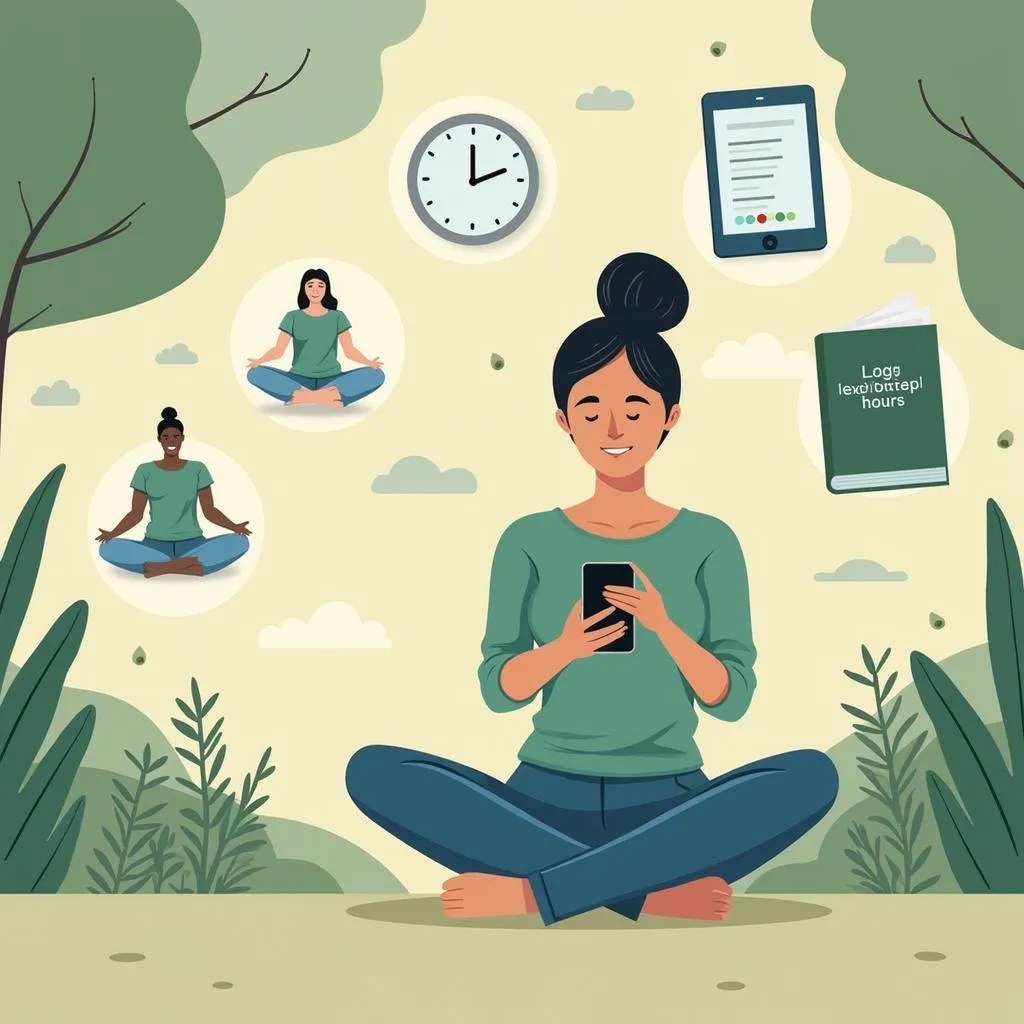Introduction to the Topic
The topic “describe a time when you couldn’t use your mobile phone” is a common theme in IELTS Speaking tests, particularly in Part 2. It reflects the prevalence of mobile phones in our daily lives and tests candidates’ ability to narrate a personal experience. This topic has appeared frequently in past IELTS exams and is likely to remain relevant in future tests due to our increasing dependence on mobile devices.
Nội dung bài viết
Part 1: Introduction and Interview
In Part 1, the examiner may ask general questions about mobile phones and technology. Here are some possible questions:
- How often do you use your mobile phone?
- What do you mainly use your mobile phone for?
- Do you think people rely too much on their mobile phones these days?
Let’s focus on question 3 for a sample answer:
Sample Answer (Band 8-9):
“That’s an interesting question. I firmly believe that many people have become overly dependent on their smartphones nowadays. It’s not uncommon to see individuals constantly glued to their screens, even in social situations. This overreliance can lead to various issues, such as diminished face-to-face communication skills and reduced productivity. However, it’s important to acknowledge that mobile phones also bring numerous benefits, like instant access to information and improved connectivity. The key, in my opinion, lies in striking a balance and using these devices judiciously.”
 People using mobile phones in social gathering
People using mobile phones in social gathering
Part 2: Long Turn
Cue Card
Describe a time when you couldn’t use your mobile phone.
You should say:
- When it happened
- Where you were
- Why you couldn’t use your phone
- How you felt about it
Sample Answer (Band 6-7)
“I remember a time last year when I couldn’t use my mobile phone. It happened during a family vacation to a remote mountain village. We were staying in a small guesthouse surrounded by beautiful scenery.
The reason I couldn’t use my phone was that there was no signal in the area. The village was so isolated that it didn’t have any cell towers nearby. At first, I felt a bit anxious and disconnected. I was used to checking my phone regularly for messages and social media updates.
However, as time passed, I started to enjoy the experience. It was refreshing to be free from constant notifications and distractions. I spent more time talking with my family and enjoying the natural surroundings. We went on hikes and played board games in the evenings.
By the end of the trip, I realized that being without my phone had actually made the vacation more enjoyable. It helped me relax and connect with my family in a way that I hadn’t done in a long time. It was a good reminder that sometimes it’s nice to disconnect from technology and focus on the present moment.”
Sample Answer (Band 8-9)
“I’d like to recount an experience from last summer when I found myself unexpectedly disconnected from my mobile phone. The incident occurred during an impromptu weekend getaway to a quaint coastal village that I’d spontaneously decided to explore.
The catalyst for my phone’s unavailability was a rather unfortunate accident. While admiring the picturesque shoreline, I inadvertently dropped my device into the sea. The salt water rendered it completely inoperable, leaving me entirely cut off from my usual digital connections.
Initially, I felt a palpable sense of unease. The absence of my constant digital companion left me feeling somewhat disoriented and out of touch with my regular routine. However, this initial discomfort soon gave way to a surprisingly liberating sensation.
As the hours passed, I found myself becoming increasingly immersed in my surroundings. I engaged in meaningful conversations with locals, savoring their stories and gaining unique insights into the village’s history and culture. The lack of digital distractions allowed me to fully appreciate the breathtaking coastal scenery and relish the simple pleasures of uninterrupted contemplation.
This experience served as a poignant reminder of the value of occasional disconnection in our hyper-connected world. It reinforced the importance of being present in the moment and fostering genuine human connections. While I certainly don’t advocate for permanently abandoning our devices, this incident highlighted the benefits of periodic digital detoxes for our mental well-being and personal growth.”
 Picturesque coastal village shoreline
Picturesque coastal village shoreline
Follow-up Questions
- How did this experience change your perspective on mobile phone usage?
- Do you think people should intentionally take breaks from their phones? Why or why not?
Sample Answer for Question 1 (Band 8-9):
“This experience profoundly altered my perspective on mobile phone usage. It served as a wake-up call, highlighting the extent of my dependency on digital devices. I realized that constant connectivity, while convenient, can often hinder our ability to fully engage with our surroundings and the people around us.
The incident prompted me to reassess my relationship with technology. I now make a conscious effort to create phone-free periods in my daily routine, allowing for more mindful interactions and self-reflection. This balance has led to improved mental clarity and more meaningful personal relationships.
Moreover, the experience underscored the importance of developing self-reliance and problem-solving skills that don’t rely on immediate access to information. It reminded me of the value of traditional methods of navigation, communication, and entertainment that we often overlook in our digital age.
Ultimately, while I still appreciate the benefits and conveniences of mobile technology, this experience has instilled in me a greater appreciation for periodic disconnection and the unique opportunities for growth and connection that arise when we step away from our devices.”
Part 3: Two-way Discussion
Examiner: “Do you think people are too dependent on their mobile phones these days?”
Sample Answer (Band 6-7):
“Yes, I think many people are too dependent on their phones nowadays. It’s common to see people always checking their phones, even when they’re with friends or family. This can be a problem because it affects real-life communication and relationships. Also, some people feel anxious when they don’t have their phones, which isn’t healthy.
However, phones are also very useful for many things like staying in touch with people, getting information quickly, and for work. So, while I think there’s too much dependence, I also understand why people use their phones so much.
I believe it’s important to find a balance. People should try to limit their phone use sometimes, especially during social situations or when they need to focus on work or studies.”
Sample Answer (Band 8-9):
“The question of mobile phone dependency is indeed a complex and nuanced issue. On one hand, it’s undeniable that smartphones have become an integral part of modern life, offering unprecedented access to information, communication, and productivity tools. They’ve revolutionized the way we work, socialize, and navigate the world around us.
However, I concur that there’s a growing concern about over-reliance on these devices. Many individuals exhibit signs of nomophobia – the fear of being without a mobile phone – which can lead to anxiety and social disconnection. The compulsive checking of phones, even in inappropriate situations, suggests a level of dependency that can be detrimental to mental health and interpersonal relationships.
Moreover, this dependency can impair cognitive functions like attention span and memory, as we outsource many mental tasks to our devices. It’s also worth noting the potential for addiction, particularly to social media and mobile games, which can have serious consequences on productivity and well-being.
That being said, it would be overly simplistic to label all frequent phone use as problematic. The key lies in cultivating a healthy relationship with technology. This involves setting boundaries, practicing mindful usage, and regularly engaging in device-free activities. Education about digital wellness and the promotion of tech-life balance are crucial steps in addressing this issue.
In conclusion, while mobile phones offer immense benefits, it’s imperative that we remain cognizant of their potential drawbacks and strive for a balanced approach to their use in our daily lives.”
 Person practicing mindful phone usage
Person practicing mindful phone usage
Key Vocabulary and Phrases for High Scores
-
Inadvertently (adverb) /ˌɪnədˈvɜːtəntli/ – without intention; accidentally
Example: I inadvertently left my phone at home this morning. -
Palpable (adjective) /ˈpælpəbl/ – able to be touched or felt
Example: There was a palpable sense of relief when I finally found my lost phone. -
Catalyst (noun) /ˈkætəlɪst/ – a person or thing that precipitates an event
Example: The power outage was the catalyst for me realizing how dependent I am on my phone. -
Quaint (adjective) /kweɪnt/ – attractively unusual or old-fashioned
Example: We stayed in a quaint village where mobile reception was non-existent. -
Liberating (adjective) /ˈlɪbəreɪtɪŋ/ – providing freedom from a constraining situation
Example: It was surprisingly liberating to spend a day without my mobile phone. -
Poignant (adjective) /ˈpɔɪnjənt/ – evoking a keen sense of sadness or regret
Example: It was a poignant reminder of how much we rely on our phones when mine stopped working.
Examiner’s Advice
To achieve a high score in the IELTS Speaking test, particularly when discussing topics like mobile phone usage:
-
Develop your answers: Provide detailed responses with examples and personal experiences.
-
Use a range of vocabulary: Incorporate advanced vocabulary and idiomatic expressions naturally in your speech.
-
Maintain fluency: Practice speaking on various topics to improve your ability to speak at length without hesitation.
-
Show critical thinking: Analyze topics from different perspectives and provide balanced views.
-
Use appropriate structures: Employ a mix of simple and complex sentence structures accurately.
-
Stay relevant: Always address the question directly and stay on topic throughout your answer.
-
Practice pronunciation: Work on clear pronunciation and natural intonation to enhance your overall speaking performance.
Remember, consistent practice and exposure to English in various contexts are key to improving your speaking skills for the IELTS test.


